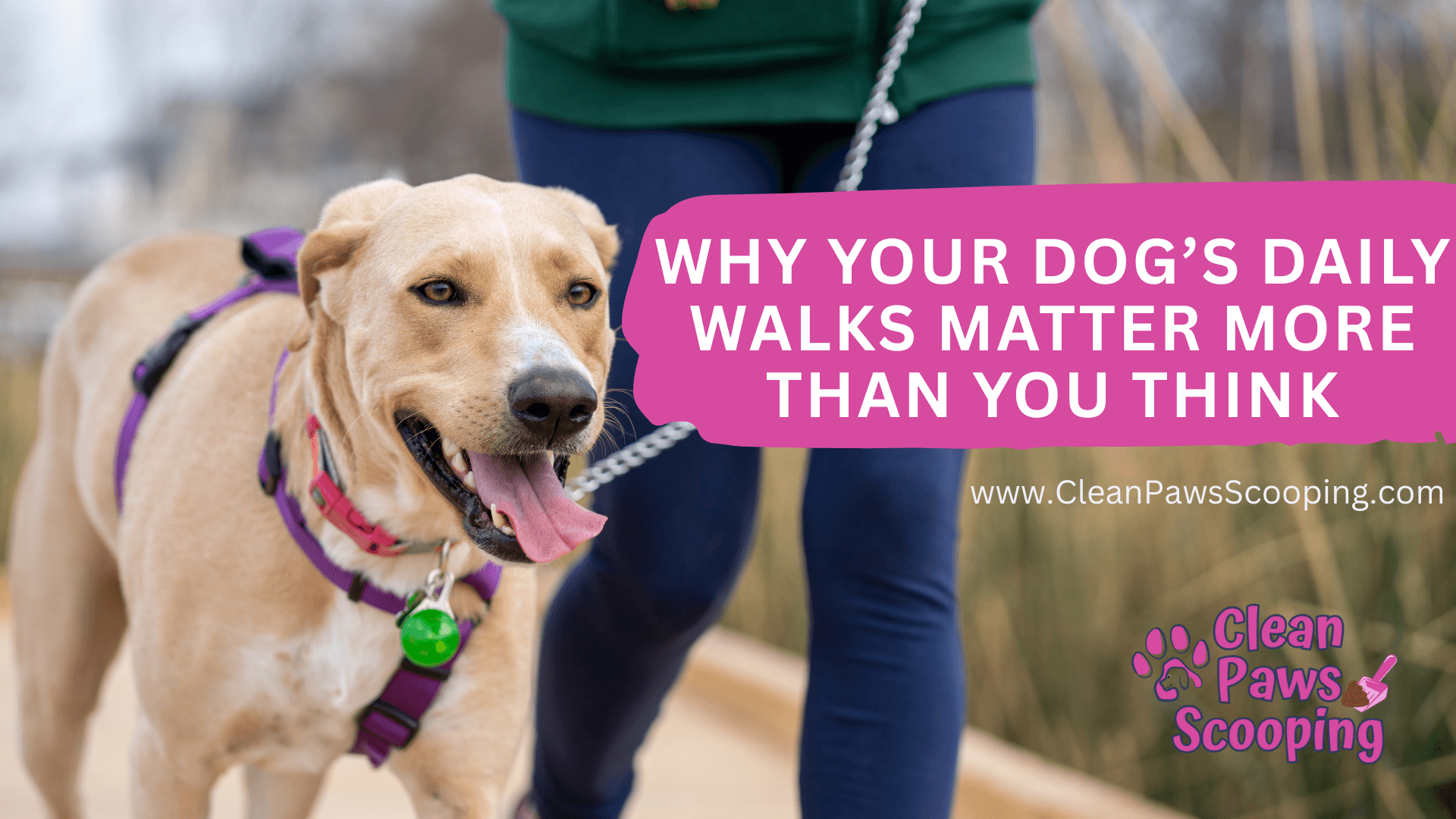Why Your Dog’s Daily Walks Matter More Than You Think

A walk may seem like a small part of your dog’s day—but in reality, it’s one of the most important. Far more than just a bathroom break or a chance to burn off energy, your dog’s daily walk is a cornerstone of their physical and mental well-being. In the Georgia heat, especially in areas like Alpharetta, Roswell, Duluth, and Smyrna, making the most of each walk while keeping safety in mind is critical for happy, healthy pups.
In this blog, we’re digging deep (pun intended) into why that daily stroll is so essential—and how to make it even more beneficial for your dog.
1. Walks Are Vital for Your Dog’s Physical Health
Daily walks help your dog stay in shape, maintain a healthy weight, and reduce the risk of health problems like heart disease, diabetes, and arthritis. Just like humans, dogs need consistent movement to keep their muscles strong and their joints flexible.
Different breeds have different activity needs—high-energy breeds like Labs, Border Collies, and Huskies may require multiple walks a day, while smaller or older dogs might do best with one or two shorter strolls. But no matter the breed or age, skipping the walk entirely can lead to more than just cabin fever.
Bonus Tip: During Georgia summers, try walking your dog in the early morning or late evening to avoid the hottest parts of the day. And always check the pavement with your hand—if it’s too hot for you, it’s too hot for their paws.
2. Mental Stimulation Is Just as Important as Physical Exercise
Walks aren’t just about movement—they’re full of smells, sights, sounds, and social opportunities that engage your dog’s brain.
Beyond daily routines, walking provides long-term physical and emotional benefits for both dogs and their humans. Understanding the benefits of walking your dog can help you stay consistent and get even more value out of every stroll.
A quick sniff of a fire hydrant or the breeze blowing through a park can tell your dog more than any doggy TV show ever could.
This mental stimulation is crucial in preventing boredom, which can lead to destructive behaviors at home. If your dog is chewing your shoes, digging in the backyard, or barking excessively, they may just be craving some outdoor enrichment.
Make It Even Better: Let your dog lead the way every now and then—within reason. Sniffing is their way of reading the newspaper or catching up on the latest neighborhood gossip. A “sniffari” can be more fulfilling than a brisk mile walk!
3. Walks Are an Opportunity for Training and Bonding
Consistent walks are a chance to reinforce leash manners, practice commands, and build trust between you and your dog. Training doesn’t have to happen in formal sessions—simple things like stopping at crosswalks, sitting before crossing the street, or practicing “heel” when passing other dogs help reinforce obedience and build your connection.
Dogs crave routine and structure. When you walk your dog consistently, you’re providing predictability and a sense of safety that contributes to their emotional well-being.
Try This: Use part of the walk to practice recall (“come”), focus (“watch me”), or polite leash walking. Keep treats on hand for praise and reward. It turns an ordinary outing into a training adventure!
4. Walks Help Regulate Digestion and Bathroom Habits
Let’s face it—dogs are creatures of habit. Going for walks at the same time each day can help regulate their bathroom schedule, which makes your life as a pet parent much easier. It also helps you keep an eye on their digestive health. If anything seems off with their poop (too loose, too hard, unusual color), regular walks make it easier to spot changes.
P.S. Speaking of poop—if you’re tired of dealing with yard waste and want to keep your lawn clean for post-walk playtime, that’s where we come in. Clean Paws Scooping helps you stay on top of it all so you can enjoy more quality time with your dog.
5. Walking Reduces Anxiety and Behavioral Issues
Many dogs, especially rescues and younger pups, experience anxiety that can manifest in ways like pacing, whining, or destroying furniture. A well-exercised dog is less likely to show these behaviors.
Daily walks release endorphins, reduce cortisol (stress hormones), and help your dog feel calmer and more balanced. It’s also a reliable outlet for pent-up energy that could otherwise be directed toward inappropriate behaviors.
Social Tip: If your dog is reactive to other dogs or people, walking can be a slow and steady way to build confidence—especially with positive reinforcement and patience. Avoid busy times and gradually build exposure.
6. It’s Good for You, Too
Let’s not forget: walking your dog is also good for your health. Studies have shown that dog owners who walk their dogs regularly tend to be more active, have lower blood pressure, and experience reduced stress levels.
Plus, it’s a chance to unplug from your phone, get fresh air, and spend quality time with your best friend. Win-win.
- Dog parks: On days when you do have daylight and good weather, visit your local dog park. This provides a great opportunity for your dog to run and play freely with other dogs, which is excellent exercise and mental stimulation.
- Group walks or playdates: Organize group walks with friends or neighbors who have dogs. Not only will this motivate you to keep up with the routine, but it will also give your dog much-needed social interaction. If walks aren’t possible, try setting up regular playdates in a fenced yard or safe indoor space.
Final Thoughts: Small Habit, Big Results
A daily walk might not seem like much—but to your dog, it’s everything. It’s their time to move, explore, connect, and feel fulfilled. And for you, it’s a moment of peace, partnership, and purpose in the midst of a busy life.
Whether you’ve got a new puppy who’s just learning the leash or a senior dog who enjoys a slow stroll through Alpharetta’s shaded sidewalks, daily walks are essential to their overall happiness.
Keep Your Yard Just as Clean as Your Walking Route
Tired of dealing with what your dog leaves behind after those walks? Let us help. At Clean Paws Scooping, we specialize in keeping your outdoor space clean, odor-free, and safe for all your summer adventures—without you lifting a finger.




